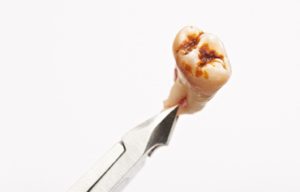 Ancient humans used crude tools to clean their teeth, ate a coarse diet, and ended up fully or partially without teeth within a few decades of life. Through the ages, people have gotten better at caring for their smiles, and today, the rate of tooth loss has significantly decreased. However, the consumption of diets higher in sugary and acidic foods have caused a noted increase in cavities. In order to properly care for your teeth and keep your smile cavity free, you’ll need to know more about how cavities form.
Ancient humans used crude tools to clean their teeth, ate a coarse diet, and ended up fully or partially without teeth within a few decades of life. Through the ages, people have gotten better at caring for their smiles, and today, the rate of tooth loss has significantly decreased. However, the consumption of diets higher in sugary and acidic foods have caused a noted increase in cavities. In order to properly care for your teeth and keep your smile cavity free, you’ll need to know more about how cavities form.
Anatomy of a Healthy Mouth
When we eat foods, oral bacteria absorb nutrients from these foods and break them down. However, like all living organisms, bacteria produce waste. The waste produced by oral bacteria is a sticky, acidic bioflim called plaque. Saliva in the mouth neutralizes these acids, and keeps patients smiling.
Cavity Formation
Though saliva typically neutralizes plaque acids, it may be unable to completely neutralize plaque acidity when people consume foods and drinks high in sugar or acidity. When the acidity of foods and beverages and/or the plaque they produce is higher than the neutrality of saliva, the plaque sticks to teeth slowly breaking down the enamel. Most people will then remove this plaque by brushing and flossing. However, some plaque may remain caught between teeth or deep in a crevice on the biting surfaces of the tooth. Left in place, this plaque breaks down enamel causing cavities.
Preventing Tooth Decay
Luckily, cavities are easy to treat. Most dentists offer simple, same day fillings that are crafted from a tooth-colored composite resin that will renew the shape, appearance, and function of the smile. However, preventive dentistry is always the best option. Some preventive dentistry tips to preserve natural tooth structures include:
- Brush teeth twice a day for at least two minutes at a time
- Floss at least once each day
- Use a soft bristled toothbrush and fluoridated toothpaste
- Reduce the quantity of sugar in your diet
- Limit consumption of acidic foods and beverages like citrus fruits or sodas
- Visit your dentist at least twice a year for dental checkups and teeth cleanings
Meet the McCarl Dental Team
At McCarl Dental Group, we are dedicated to helping patients improve their oral health and keep their smiles whole and healthy for life. We truly believe that educated patients are the best patients. If you want to learn more about how to care for your smile, come back regularly to read our blog. You can also contact us in our Millersville dental office. We’re always here to help whenever you need us, so please don’t hesitate to reach out if you have questions.
